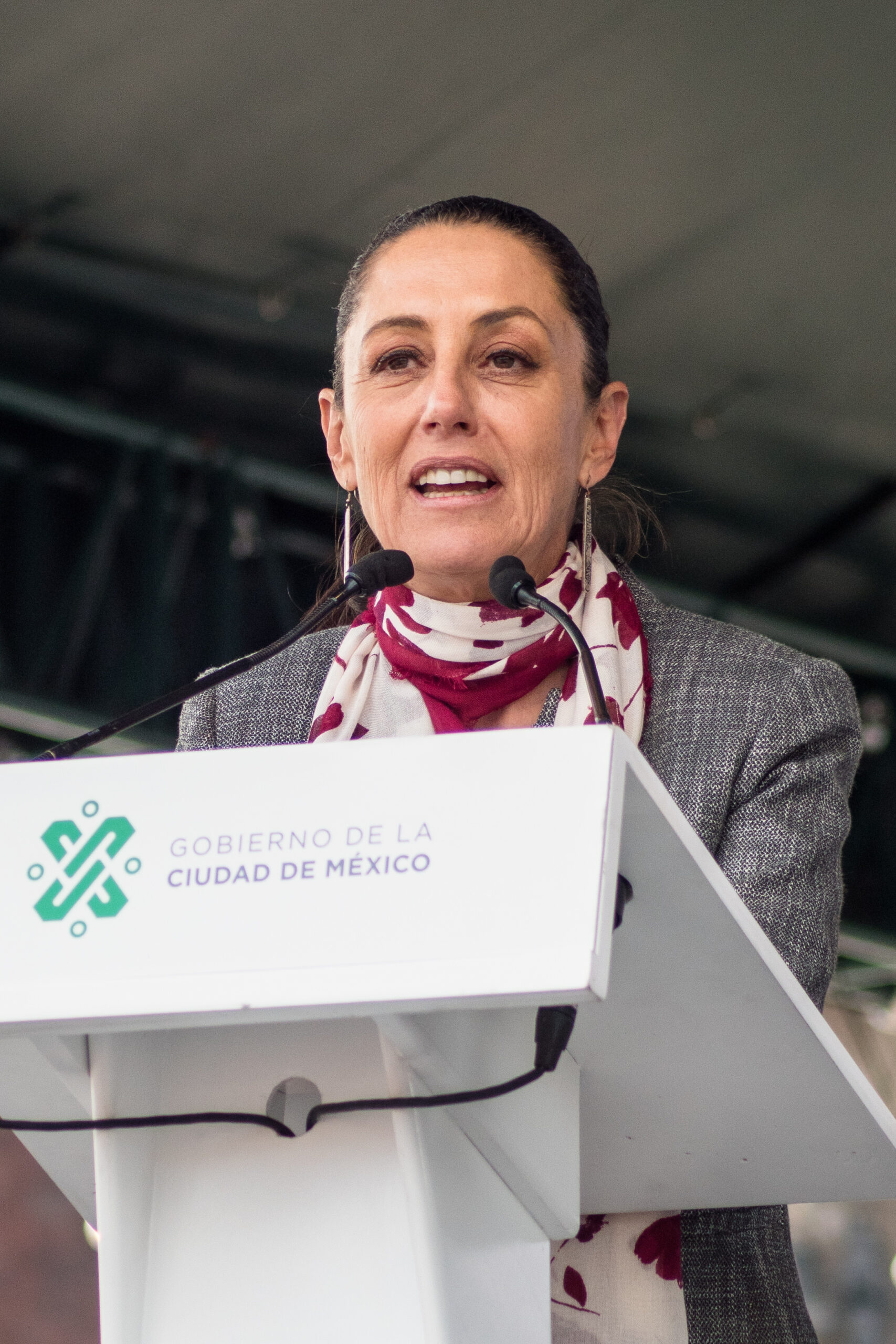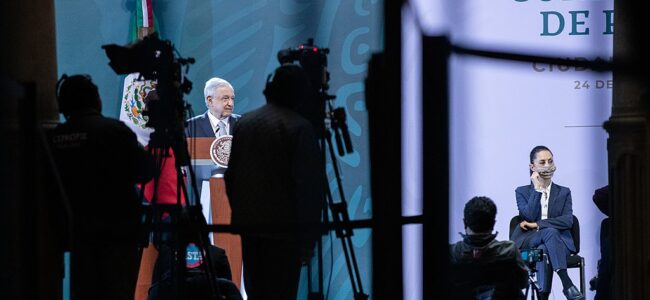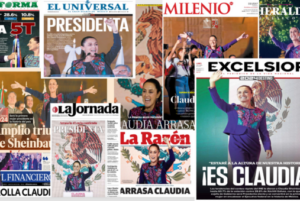Three days before her resounding victory in Mexico's presidential elections on June 2, Claudia Sheinbaum made an important commitment to the safety of journalists in the country. As the two main opposition candidates had already done, she signed a pledge proposed by the organization Reporter Without Borders (RSF, for its acronym in French) promising to protect and defend press freedom and Mexican journalists.
The signing of the document, combined with other actions by Sheinbaum, led some to anticipate that the situation of journalists in Mexico could improve. The current situation is catastrophic: during the six years that Andrés Manuel López Obrador has been president, at least 37 Mexican journalists were murdered, keeping the country at the top of the list for deadliest places for the press, not counting Gaza. Every 14 hours, a journalist is attacked in the country.
The absence of consequences, meanwhile, predominates. The rate of impunity for crimes against journalists in Mexico is 98%, according to the organization Article 19. In the case of disappearances of journalists, the rate of unsolved crimes reaches 100%.
In addition to the brutal violence of organized crime, which is embedded in various structures of the State and emerged with the intensification of the war on drugs in 2006, during his administration, AMLO himself directed new attacks on the press. At the mañaneras, his daily morning press conferences, he was frequently hostile against the press.
Often, if a journalist asked the president a critical or uncomfortable question, instead of responding to the argument, López Obrador would attack the journalist. The current president even revealed a journalist’s alleged income during a press conference. In February of this year, he released private information for The New York Times bureau chief in Mexico, Central America and the Caribbean.
The commitment made by his successor, who is from López Obrador’s party, Morena, includes five axes: prioritizing the defense of journalism and the right to information; guaranteeing full protection for journalists; promoting legislation that safeguards the ability to practice journalism in complete safety; combating impunity for crimes of violence against journalists; developing sustainability and security measures for the media in areas where disappearances occur.

Claudia Sheinbaum, the new president-elect of Mexico, in a photo of February 2020, when she was Mexico's city head of government (Photo: Gabriela Malagón/ Secretaría de Cultura de la Ciudad de México)
These axes are divided into 22 measures. Sheinbaum, who will take office on Oct. 1, has committed to launching a working group in the first quarter of 2025 to move towards its fulfillment, under the coordination of the Government Secretariat.
For all promises to become reality, experts say actions will be necessary at different levels. The country's existing protection mechanism for journalists and human rights defenders needs reform. State authorities will also have to collaborate much more with the government. Finally, combating impunity, which is at the heart of the problem, requires profound reforms so that effective investigations can take place. According to experts, six years is not enough to solve a problem of this magnitude.
But what can the new president of Mexico do to improve the protection of journalists? Where should she start? And what can actually be expected from Claudia Sheinbaum?
Defenders of press freedom agree that the first action Sheinbaum can take to increase the safety of journalists is simple and has zero financial cost: adopt less hostile behavior than López Obrador's and, in doing so, reduce tensions.
“It is essential that journalistic work be recognized, not stigmatized, and acts of violence rejected,” Balbina Flores Martínez, Mexico representative for RSF told LatAm Journalism Review (LJR). Flores Martínez was the main coordinator in the country for the pledge signed by Sheinbaum and the other candidates.
The importance of ending these attacks coming from the most important office in the country goes beyond protecting journalists who deal directly with the Mexican Executive Branch. When a president attacks a journalist, other lower-level officials and political activists feel emboldened to do the same, Javier Garza, a journalist in the northern state of Coahuila and director of the group Horizonte Lagunero, told LJR.
“AMLO, with constant attacks on the press, was creating a climate of hostility. If the president attacks journalists, I can too. Lesser officials do it, as well,” Garza said.
A good example from above can have a beneficial ripple effect on these authorities, said Leopoldo Maldonado, regional director of Article 19 in Mexico and Central America.
“With the control that Morena has today in various states and in their congresses, this can be achieved: not defaming, slandering, insulting and carrying out all these verbal crimes that are done as a way of putting pressure on the press,” Maldonado told LJR.
In her behavior to date, including a term as head of the government of Mexico City (2018-2024), Sheinbaum has not been so hostile in relation to the press as AMLO. Even so, Garza added that the president-elect “has had a certain disdain towards the media. She tends to classify anything negative or critical as negative or fake news. It hasn't been as intense, but I don't see her as a person who has press freedom very high on her scale of values."
López Obrador's shadow could also weigh on Sheinbaum's government, and this has the potential to generate conflicts with the press. Although the current president has said he will retire, it is unlikely that he will completely distance himself from Morena, the party he built, and from public life.
"If he decides that Claudia needs to up the pressure on journalists because they're being too critical and talking poorly about the party, I wonder if Sheinbaum will be able to resist that pressure and be her own president, be her own woman in that fight. It's hard to operate under such a giant enormous shadow. López Obrador is the most important politician that Mexico has had this century,” Jan-Albert Hootsen, representative for Mexico of the Committee to Protect Journalists (CPJ), told LJR.
If adopting a less hostile attitude towards the press requires only good will from Sheinbaum, other measures to increase the protection of journalists require more sophisticated policies.
Among the 22 measures assumed in the commitment to the RSF are: reviewing the functioning of the federal protection mechanism; prioritizing the search for missing journalists in Mexico; guaranteeing full reparation to victims and that events that harm families and society not be repeated; developing investigation, accountability and protection policies so that areas where the media are disappearing do not become silenced regions or states, as is already happening in several parts of the country.
According to Amnesty International and CPJ, eight journalists have been murdered while registered with Mexico's Protection Mechanism for Human Rights Defenders and Journalists over the past seven years, a number that highlights the urgent need to strengthen and reform the institution.
The federal mechanism was created in 2012 with the mission of protecting human rights defenders and journalists in the country at extreme risk of threats and attacks due to their work. In a report published in March, “‘Nobody Guarantees My Safety’: The Urgent Need to Strengthen Mexico's Federal Policies to Protect Journalists,” Amnesty International and CPJ assess that while the mechanism did provide security for some journalists, there were flaws for the protection of many others.
According to CPJ's Hootsen, the mechanism needs more funding and better training for its employees. He said it is also necessary to decentralize it and establish regional offices to deal with threats more effectively outside the capital.
“The mechanism is highly centralized and focused on Mexico City. So it doesn't have any regional offices whatsoever. So it often depends on contact with civil society groups in order to get the right contacts and knowledge to deal with threats against reporters,” Hootsen said.
Even if a reporter is identified as being at risk, there are often communication problems between different bodies in order to protect the professional, he added. There are also difficulties in the way protective measures are applied, and coordination with state governments is flawed. And there are topics that require specific attention, such as the relocation of journalists.
Reforming the mechanism from a centralized institution that works only at the federal level to something that has national reach will be complicated, Hootsen said.
“This requires changing the Constitution and making sure that state governments will go along with creating their own institutions on the local level and linking them to the federal institutions,” he said. “This takes years to change. There was some talk of a reform in that sense over the past two to three years, but it never really gained any speed or momentum."
Morena gained a qualified majority in the Federal Congress and also in several states that it controls, so it could change the Constitution if it wanted. There are, however, no signs in this regard in the area of press freedom. Without citing journalism or the protection mechanism, party leaders have already said they want to start voting as soon as they can, in September, on 18 constitutional amendments.
A bill stalled in Congress since 2018 proposes revisions to the mechanism. Balbina Flores, from RSF, said that “a law must be built from the bottom up, starting with journalists.” Even if the law changes, however, there is no guarantee that the new provisions will be complied with.
“The problem in Mexico is not always the lack of laws, but rather their compliance. It is necessary to make adjustments to ensure that the laws are effectively complied with,” Flores said.
It is necessary to strengthen the mechanism, but it needs to be complementary to investigation, damage compensation and many other functions of the State that are distributed among different institutions, said Leopoldo Maldonado, from Article 19.
“There is increasing dependence on the sector of human rights defenders and journalists to turn to this mechanism to resolve their security problems because the police and judicial institutions do not do so,” Maldonado said.
“Much is said about the need for the mechanism, but let us take into account that this instance must be temporary and transitory; It cannot always exist. The security of the press has to be guaranteed eventually by the proper institutions in a normal democracy, in 10, 15, 20 years,” he added.

The current Mexican president, Andrés Manuel López Obrador, during one of his daily press conference at the City Hall of Mexico City, accompanied by Claudia Sheinbaum, then head of government of Mexico City, in 2020 ( (Photo: EneasMx/ Creative Commons 4.0 license)
At the heart of the problem of violence against journalists are the issues of impunity, the inability to investigate and infiltration and the collusion of agents of the Justice system with organized crime, experts say.
The protection mechanism can only respond to threats, but cannot investigate threats and cannot punish violence against reporters. Therefore, it is palliative.
To protect its journalists, Mexico will need significant changes to its judiciary and other law enforcement institutions.
"If attacks are investigated quickly and forcefully, an aggressor understands the message. The best deterrent is for him to see that the person who just attacked paid for it,” Javier Garza said.
The big bottleneck is the prosecutor's offices and local police agencies, which cause the vast majority of cases to stop at the investigation stage, without going to trial, Maldonado said. According to him, the “Protocol on offenses against freedom of expression, from 2018,” can offer guidance on how law enforcement bodies can coordinate.
For them to actually do so, however, considerable reforms are needed, because many law enforcement agencies are corrupt. Behind the violence against journalists is drug trafficking, corruption, environmental crimes, financial crimes, and their infiltration of the State.
“The entire justice administration structure in Mexico has to be changed. It is necessary to adopt this investigation protocol for crimes against journalists, but this requires the capacity for context analysis, criminal analysis, strengthened and interoperable databases; That is, a whole infrastructure that does not exist today,” Maldonado said.

Compilation of newspaper covers from Mexico following election day, where Claudia Sheinbaum emerged as the winner (Art by WendyAvilesR/CC Zero)
“Above all, it is necessary to purge the prosecutor's offices that are penetrated by political and criminal interests, and that is going to take time.”
If Sheinbaum wants to be the historic president she aims to be, reducing the rate of impunity in Mexico will be her biggest challenge. In view of this problem, which experts say requires legislative and operational changes, one presidential term seems too short. However, Mexico's first female president can take a first step.
“In order to promote the required reforms, you’re going to have to ruthlessly root out corruption. You have to get rid of bad actors. You have to make sure that everybody working within the prosecutors and the police is squeaky clean. Now, that’s an enormous undertaking. Six years is not enough. But you can make a start. You can start dealing with this, and that’s her task—making a start,” Hootsen said.
The RSF representative in Mexico, who describes as “titanic” the coordination work necessary for the three main candidates to make a commitment to the organization, agrees. A first step has been taken, but the real work is ahead.
"The truth is that the signing of these commitments opens a door, a hope, a light that things can change. We are clear that things have to change now. Mexico cannot spend another six-year term counting murders, deaths and disappearances. Journalistic work deserves respect. Above all, society deserves it,” Balbina Flores said.
LJR attempted to speak to Claudia Sheinbaum's transition office, writing to the only email address available on its official website, but the messages were returned without reaching the recipient.